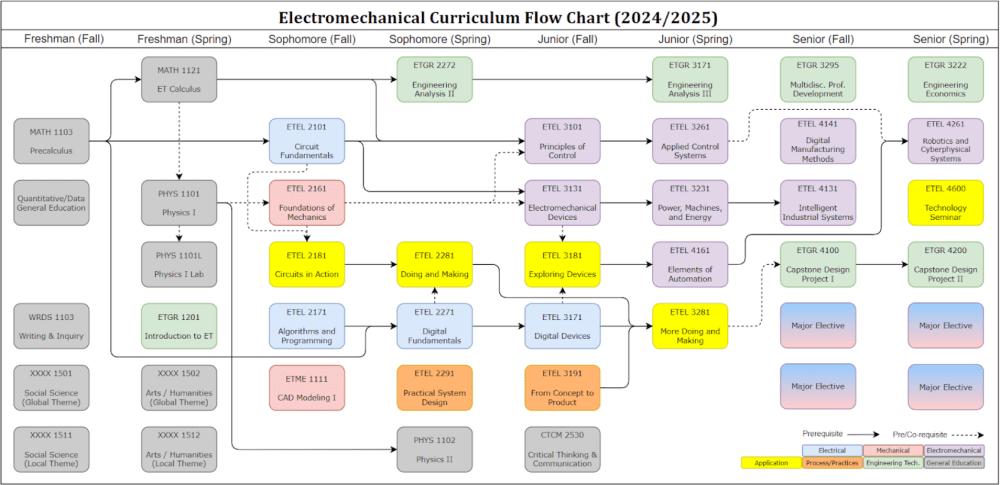Electromechanical Engineering Technology
(as of July 2024: Electrical Engineering Technology becomes Electromechanical Engineering Technology)
The Bachelor of Science in Electromechanical Engineering Technology (B.S.E.T) is designed to equip students with the knowledge, skills, and expertise needed to thrive in the dynamic field of electromechanical systems. This interdisciplinary program integrates principles of both electrical and mechanical engineering, preparing students to work at the intersection of these two critical disciplines.
Graduates can expect to pursue careers in the following industries:
- Robotics and Mechatronics Engineering
- Aerospace and Transportation
- Automation and Manufacturing
- Controls Engineering
- Medical Equipment and Technology
- Power Generation and Distribution
- Sustainable and Renewable Energy
- Test and Quality Engineering
- Instrumentation and Data Acquisition
- Application and Field Engineering
Graduates may be qualified for the following jobs:
- Electrical Engineering Technologist
- Electronics Engineer
- Automation and Controls Engineer
- Instrumentation Engineer
- Test Engineer
- Manufacturing Engineer
- Quality Engineer
- Power Systems Field Engineer
- Power Distribution Engineer
- Technical Sales Engineer
The major program of study is arranged in a logical 6-semester sequence, with study moving from basic concepts through highly technical applied principles. A special focus is given to “learning while doing” with several courses held in advanced laboratories, and several professional courses are offered to assist in the development of managerial skills.
Recent Electromechanical Engineering Technology graduates have had starting salaries in the range of $70,000 – $100,000. Students also have direct access to a Master of Science degree in Applied Energy and Electromechanical Engineering (AEEE), with as little as one additional year of study.
Note: The program changes name from Electrical Engineering Technology to Electromechanical Engineering Technology on July 1, 2024. Applicants for Electromechanical Fall 24 should apply for Electrical, and the change will be made automatically during the summer.
Major Curriculum
Electrical Engineering Technology (as of July 2024: Electrical Engineering Technology becomes Electromechanical Engineering Technology)
Students who are interested in Applied Energy are able to add a concentration.
Transfer students
The Electrical Engineering Technology program welcomes transfer students at various levels of academic progression with many students being able to complete their BSET degree in just two additional years after admission into the major.
Transfer admission into the major occurs with one of the following two scenarios:
1. Transfer applicants who have an Associate of Applied Science (AAS) degree must:
- Hold the AAS degree in an appropriate field: Automation, Computer, Controls, Electrical, Electronics, Industrial, Instrumentation, Manufacturing, Mechatronics, Robotics, or similar title.
- A minimum GPA of 2.50 (out of 4.00) in the AAS degree.
- Have completed satisfactorily, and transferred in, courses equivalent to the lower-level courses. Missing lower-level courses may be taken at UNC Charlotte.
2. Transfer applicants who have an Associate in Engineering (AE) or an Associate of Science (AS) or do not have an Associate in Applied Science (AAS) degree in an appropriate field must meet the University Transfer Admission Requirements.
changing your major
If you are interested in changing your major to Electrical Engineering Technology, please follow the guidance described here.
Early Entry M.s. Degree
Students wishing to pursue a master of science degree may choose to enroll in the early entry program and obtain their M.S. in Applied Energy and Electromechanical Engineering in just two additional semesters.
Applied Energy and Electromechanical Engineering
contacts


Accreditation
Accredited by the ETAC Accreditation Commission of ABET, https://www.abet.org, under the commission’s General Criteria and Program Criteria for Electrical Engineering Technology.
Program educational objectives and student learning outcomes.

